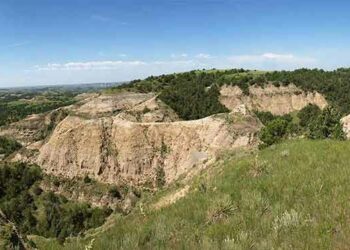BISMARCK — North Dakota’s abortion ban was struck down Thursday, Sept. 12, by a state judge who ruled the law to be “confusing and vague” and, therefore, unconstitutional.
State District Judge Bruce Romanick wrote in an opinion that the ban violates the state’s constitution, which he said establishes the fundamental right to access abortion before a fetus is viable.
The ruling came over a month after Romanick
canceled a trial
surrounding a lawsuit filed by a group of reproductive health providers and what used to be North Dakota’s lone abortion provider, Red River Women’s Clinic, following the United States Supreme Court overturning Roe v. Wade in 2022. The state had motioned to dismiss the complaint, saying the plaintiff’s arguments were based on hypothetical scenarios and that the clinic lacked legal standing because it operates in Minnesota.
The Red River Women’s Clinic moved across the Red River into Moorhead in 2022.
Romanick acknowledged the gravity of the decision to reject the state’s request. He wrote that the ruling was his “best effort” to uphold rights established by North Dakota’s constitution and that he has “no idea” how the State Supreme Court will address the matter.
“Pregnant women in North Dakota have a fundamental right to choose abortion before viability exists under the enumerated and unenumerated interests provided by the North Dakota Constitution,” Romanick wrote.
The opinion argues the medical exceptions outlined in the ban dismiss those rights and are based on subjective requirements related to a physician’s ability to provide abortions to prevent death or serious health risks.
In cases of rape, incest or abuse, Romanick said medical judgment isn’t criminal judgment, emphasizing that physicians cannot reasonably determine whether or not such crimes occurred because they “are not law enforcement officers, investigators, judges or jurors.” Romanick also argued that many such cases go unreported and said the six-week threshold is arbitrary.
“The state is silent as to why human life is less important in the context of rape, incest or abuse than it is otherwise,” he wrote.
“This lack of clarity in the law — forcing physicians to make a medical judgment regarding the factual circumstances of how a patient became pregnant, with no way of reliably or consistently making that determination medically, and charging them with a felony if they get it wrong — simply cannot and does not comport with the requirements of due process,” Romanick wrote.
He then said North Dakota’s history and laws surrounding abortion, women’s rights and health were outdated.
“The reality is that ‘individuals’ did not draft and enact the North Dakota Constitution. Men did,” Romanick wrote.
He said those men did not view women as equal citizens with equal rights that are protected by Article 1, Section 1 in the state constitution, which also didn’t recognize women until 1984.
“There was a time when we got it wrong and when women did not have a voice. This need not continue for all time, and the sentiments of the past, alone, need not rule in the present for all time,” Romanick wrote.
The state immediately responded with plans to appeal the decision.
“As Attorney General of North Dakota, it is my privilege to defend the laws enacted by the people’s representatives,” Attorney General Drew Wrigley said in a Thursday release. “While I have appropriate regard for the State District Court, a careful reading of Judge Romanick’s decision reveals flaws in his analysis and interpretation of controlling precedent.
“Accordingly, the State of North Dakota will appeal this ruling because Judge Romanick’s opinion inappropriately casts aside the law crafted by the legislative branch of our government and ignores the applicable and controlling case law previously announced by the North Dakota Supreme Court,” he said.
If Thursday’s ruling is upheld, abortion will be legal in North Dakota after being fully outlawed and deemed a felony for those who perform the procedure with exceptions for serious, physical threats to the mother’s health in addition to rape and incest up to six weeks.
Those in favor and opposition of the ban responded Thursday in press releases.
“The court has now thrown out this carefully balanced law with a decision that consists almost entirely of personal opinions and antiquated legal theories,” a release sent out Thursday by the North Dakota Catholic Conference. “It throws out fifty years of common-sense pro-life legislation consistently supported by North Dakotans and embraces a position more radical and liberal than Roe v Wade itself.”
State Democrat leaders, on the other hand, see the decision as a win.
“North Dakotans deserve the freedom to start and grow their families on their own terms. While today’s ruling is a victory for women’s reproductive rights, this ban should have never been allowed in the first place and our freedoms are still at stake in 2024.” Democratic-NPL Chair, Adam Goldwyn, said in a statement. “While Republicans claim to be the party of less government and individual liberty, they pass laws that put the most intimate and personal decisions in our lives in the hands of politicians.”
Source link : http://www.bing.com/news/apiclick.aspx?ref=FexRss&aid=&tid=66e5db0b3d32499090ebb4742f62b06e&url=https%3A%2F%2Fwww.dl-online.com%2Fnews%2Fnorth-dakota%2F091324-n-ff-abortionruling&c=146228030550404565&mkt=en-us
Author :
Publish date : 2024-09-12 06:56:00
Copyright for syndicated content belongs to the linked Source.






